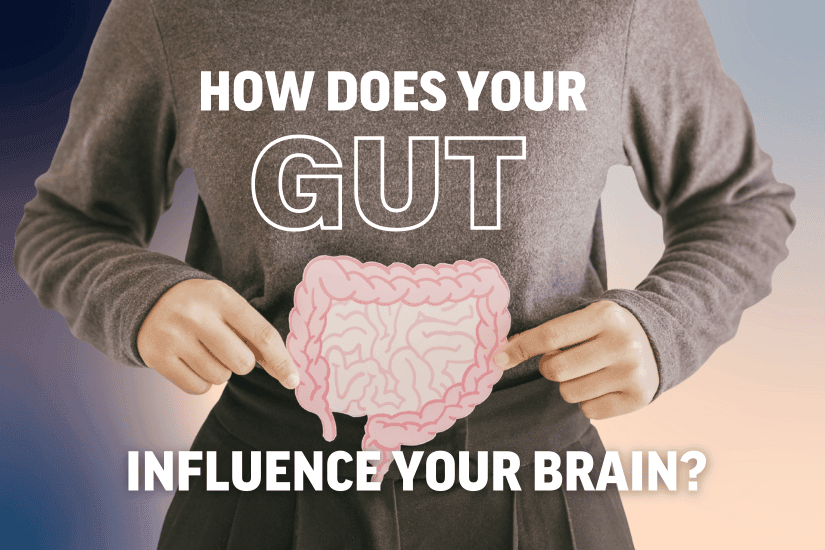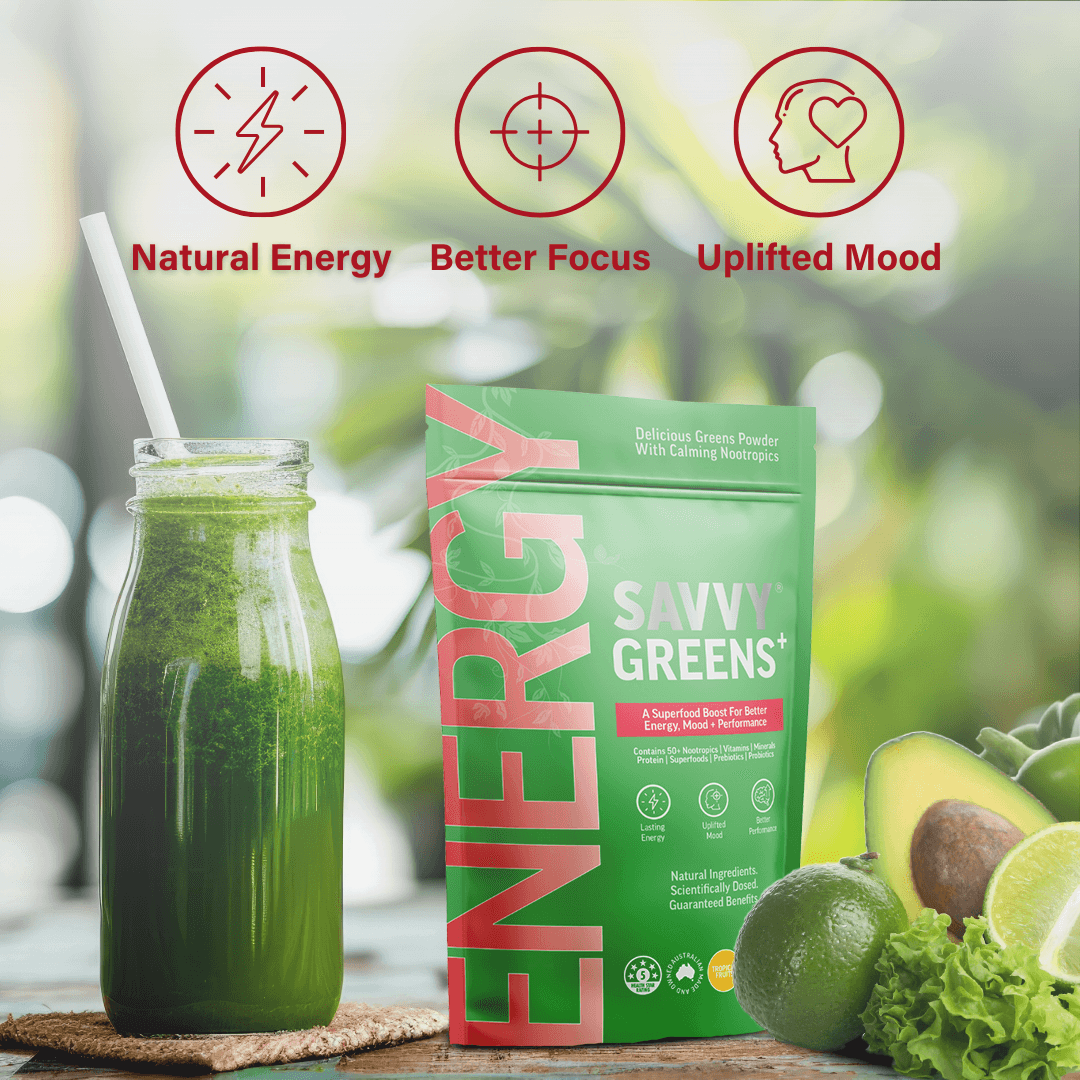
The Gut Brain Connection

Have you ever had those "butterflies in your stomach" feeling or noticed your stomach acting up when stress kicks in? It's not just random – there's actually a scientific reason behind it. We might not always realize it, but our brain and stomach are kinda like best buds, connected in some interesting ways.
Understanding the Gut-Brain Connection

Your gut and brain are like pals, always chatting through something called the gut-brain axis. [1] This communication link affects your mood, thoughts, and mental health. And guess what? Your gut is home to trillions of tiny microbes called the gut microbiome, and they play a big role in this connection. [2]
Research suggests that a happy and healthy gut can lower inflammation, reduce oxidative stress, and improve mitochondrial function.[3] These effects extend far beyond your digestive system, impacting cognitive functions and overall health. And guess what? Cool new research is telling us that things like your gut health can actually affect how your brain works. [4]
Impact on Mental Health

When we talk about mental health, it's not just about what's going on in your head. Your brain and the rest of your body are like buddies, always chatting. Scientists are now exploring the ways in which the gut biome influences mental health. Advances in technology allow large-scale analysis, revealing that gut microbiota actively participates in processes linked to brain development, psychology, and behavior.[5] The communication lines between the gut and the central nervous system tightly link your brain and stomach.
The gut microbiome can affect mental health by producing hormones, neurotransmitters, and substances like short-chain fatty acids. Studies have shown connections between gut dysregulation and diseases like multiple sclerosis, Irritable Bowel Syndrome (IBS), and even psychiatric disorders.[6] The gut-brain axis is gaining attention as a key player in conditions like depression, where inflammation and gut barrier health are often linked.
Nootropics and Your Gut - What You Need to Know

You've probably heard of nootropics, those brain-boosting substances. But did you know they might have a connection with your gut?
Nootropics, also called "smart drugs," are substances that can help improve brain functions like memory and focus. Some common ones include things like ginkgo biloba, Bacopa Monnieri, ashwagandha and even caffeine. They work in different ways, like increasing blood flow to the brain or protecting brain cells.
Recent studies suggest that nootropics might have an impact on your gut health, and a happy gut could mean a happier brain. [7] [8] Some nootropics indirectly help your gut by reducing inflammation or supporting protective mechanisms. Others might change the types of bacteria living in your gut, and that could affect your brain through the gut-brain axis.
Here are some ways nootropics can improve gut health:
- Anti-Inflammatory Effects: Some nootropics possess anti-inflammatory properties[9] , which may contribute to a reduction in inflammation in the gut. Inflammation is a factor linked to various gastrointestinal issues, and by mitigating inflammation, certain nootropics may indirectly support gut health.
- Neurotransmitter Modulation: Nootropics often target neurotransmitter systems in the brain to enhance cognitive function. These neurotransmitters, such as serotonin, are not confined to the brain but also play a role in gut function. Consequently, the modulation of these neurotransmitters may have secondary effects on the gut-brain axis.
- Microbiome Modulation: Emerging research suggests that certain nootropics may influence the composition of the gut microbiome. [10] The gut microbiome, comprising trillions of microorganisms, plays a vital role in digestive health and immune function. Modulating the microbiome may indirectly impact cognitive function through the intricate gut-brain axis.
- Stress Response Regulation - Chronic stress can adversely affect gut health, leading to conditions like irritable bowel syndrome (IBS). Some nootropics are designed to modulate the stress response, potentially helping to alleviate stress-related impacts on the gut.
- Blood Flow and Nutrient Delivery - Nootropics that enhance blood flow to the brain may also influence blood flow to the gastrointestinal tract. Improved blood flow can support the delivery of nutrients to the gut, promoting overall gut health.
How to Improve Gut Health

Improving gut health is crucial for overall well-being, as a healthy gut contributes to better digestion, nutrient absorption, and even influences mental health. Here are some simple and effective ways to enhance your gut health:
1. Diversify your diet with fiber-rich foods.
Incorporate a variety of fruits, vegetables, whole grains, and legumes into your diet. First off, fiber is your gut's best friend, found in fruits, veggies, and whole grains. Think of it as a gentle massage for your digestive system. These fiber-rich foods promote the growth of beneficial bacteria in your gut. [11]
2. Consume probiotics.
Include foods in your diet that are naturally rich in probiotics[12] .Throw in some fermented foods like yogurt, kefir, or sauerkraut, kimchi, and miso - these are like the superheroes of gut-friendly bacteria, supporting a healthy microbiome.
If you struggle to get enough probiotics through your diet, you may consider taking a high-quality probiotic supplement. Consult with a healthcare professional to determine the right supplement for you.
3. Take prebiotics.
While probiotics are foods or supplements that contain live microorganisms, prebiotics are foods (typically high-fiber foods) that act as food for human microflora.
They feed the good bacteria in your gut. Foods like garlic, onions, leeks, asparagus, and bananas are excellent sources of prebiotics. You may also take prebiotic supplements, but it's wise to consult with a healthcare professional before trying anything new.
4. Stay hydrated.
Your gut loves a good sip of water to keep things moving smoothly. And don't forget to munch on those colorful, crunchy veggies; they're a powerhouse of nutrients that your gut adores.
Drinking an adequate amount of water is essential for maintaining a healthy gut. Water helps in the digestion and absorption of nutrients, and it supports the mucosal lining of the intestines.
5. Limit processed foods and added sugars.
Processed foods and excessive sugars can disrupt the balance of bacteria in your gut.[13] Opt for whole, unprocessed foods and be mindful of added sugars in your diet.
6. Get regular exercise.
Physical activity has been linked to a more diverse and healthier gut microbiome. [14] Aim for regular exercise to support overall well-being, including your gut health.
7. Enjoy wine, tea, coffee, and chocolate.
Moderate consumption of these plant-based delights, containing polyphenols, can reduce oxidative stress, lowering the risk of neurological diseases.
Here at Savvy, we want you to embrace the pleasure of enhanced cognitive function with each invigorating sip of our nootropic-infused coffee.
Derived from the finest coffee beans and enriched with carefully selected nootropics, our brew is more than just a morning ritual; it's a holistic approach to gut health and cognitive health. Your taste buds, brain, and gut alike will thank you for this delightful journey into cognitive enhancement.

8. Avoid overuse of antibiotics.
Antibiotics can disrupt the balance of bacteria in your gut. Use antibiotics only when necessary and follow your healthcare provider's instructions to minimize potential negative effects on your gut microbiome.
9. Get adequate sleep.
Poor sleep can impact your gut health. Aim for 7-9 hours of quality sleep each night to support overall well-being, including a healthy gut. [15]
Improving gut health is a gradual process, and individual responses may vary. By adopting these lifestyle and dietary changes, you can foster a healthier gut environment and support your overall well-being. If you have specific health concerns, it's advisable to consult with a healthcare professional for personalized guidance.
Conclusion:
In the journey to a sharper mind, don't forget about your gut. Nootropics can team up with your gut buddies to give you a more comprehensive boost. By taking care of both your brain and your gut, you're setting yourself up for a double win in the game of feeling your best.
References:
[1] Gut Microbes and the Brain
[3] Exercise Modifies the Gut Microbiota with Positive Health Effects
[4] Mind-altering microorganisms
[5] The microbiome regulates amygdala-dependent fear recall
[6] Breaking down the barriers
[8] The Gut–Brain Axis, Cognition and Honey
[9] L-Theanine
[10] Effects of Gut Microbiota on the Bioavailability of Bioactive Compounds from Ginkgo Leaf Extracts
[11] Dietary Fiber and the Human Gut Microbiota
[12] Probiotics: Definition, Sources, Selection, and Uses
[13] Impact of Dietary Sugars on Gut Microbiota and Metabolic Health
[14] Fueling Gut Microbes








